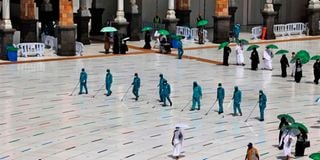Premium
Kenyan Muslims leave for Hajj

Municipal workers clean around the Kaaba, Islam's holiest shrine, at the Grand mosque in the holy city of Mecca, at the start of the Hajj season, on July 17, 2021.
At least 3,000 Kenyans will this year participate in the annual pilgrimage prayers in Mecca, Saudi Arabia.
Supreme Council of Kenya Muslims (Supkem) Coast Branch Chairman Sheikh Muhdhar Khitamy said the number is lower than they had anticipated.
“Normally, we coordinate the trip for more than 4,000 Muslims to travel for the holy prayers,” said Sheikh Khitamy attributing the low turnout to Covid-19 restrictions set by the Saudi Arabia Kingdom.
According to him, the age limit has also greatly affected the number of those wanting to travel. Those allowed to attend have to be of 60 years and below.
Kenyans left last week while others are expected to leave the country today.
The last group is expected to leave by July 5.
The first 10 days of Dhul Hijja, the twelfth and final month in the Islamic calendar, are considered holy and are a chance for the faithful to deepen their faith.
For the last two years, the faithful in the country missed out on the prayers following the limited number of attendees allowed in Saudi Arabia after the Covid-19 pandemic.
Kenyans were among other countries locked out from visiting Mecca where the prayers take place.
"The pilgrims who will attend the holy prayers will be expected to have medical insurance that will cover their treatment in case of Covid infection while in the Saudi Arabia Kingdom," read a letter released by Supkem.
The Supkem council urged pilgrims attending to follow the guidelines set by the Saudi Arabia Kingdom to minimize the risk of Covid 19 transmission.
They are required to have been vaccinated against the viral disease and have documented proof of the same.
The Hajj is marked in the first nine days of the month, which culminates in the Eid-ul-Adha or Festival of Sacrifice on the 10th day.





